Emotional Intelligence (EI) - A Better Predictor of Top Performers Than Intelligence (IQ)

Emotional Intelligence (EI) or Emotional Quotient (EQ) is considered to be the compliment to traditional IQ (Intelligence Quotient). EI has been offered as the missing link which explains why people with average IQ outperformed those with the highest IQ 70% of the time.
From two decades of research, we know the highest 90% of top performers have high emotional intelligence.
Psychology Today defines emotional intelligence (EI) as:
- The ability to accurately identify your own emotions, as well as those of others.
- The ability to utilize emotions and apply them to tasks, like thinking and problem-solving.
- The ability to manage emotions, including controlling your own, as well as the ability to cheer up or calm down another person.
When the concept was first defined in the 1990's, Yale psychologists John D. Mayer and Peter Salovey presented the concept of EI to the academic world by stating:
Employees with a high level of EI have self-awareness that helps them understand co-workers and meet deadlines.
When people have high EI, they are not bothered by client criticism; they remain focused on outcomes, rather than feeling
If two job candidates have similar IQs, the one with the higher EI will likely be a better fit for the company
Here is a paraphrased summary of the High EQ traits from the book, "Emotional Intelligence 2.0" by Dr. Travis Bradberry and Jean Greaves:
- You understand and can communicate how you feel.
- You are curious about people.
- You know your own strengths and weaknesses.
- You’re a good judge of character.
- You are difficult to offend.
- You know how to say no and set limits
- You do not fixate on mistakes.
- You give without expectation of return.
- You do not hold grudges.
- You neutralize toxic people without anger.
- You do not seek perfection.
- You appreciate what you have.
- You disconnect when necessary.
- You limit your caffeine intake.
- You get enough sleep.
- You do not indulge in negative thoughts (self-talk)
- You will not let anyone limit your joy.
Learning to be steady and make controlled reactions is a skill. It may be one of the most valuable skills of all!
Emotional Intelligence is probably one of the best developmental predictors of success, and you can train yourself and adapt your natural responses/reactions over time.
Interested in giving TrainingFlow™ a whirl? Drop us a line at lmssupport@trainingflow.com. We can answer your questions and give you the help you need to succeed.
Related Courses
30 Minutes Level: Foundational
Help your emerging leaders advance their interpersonal skills and become more resilient in the face of workplace challenges. In three, straight-to-the-point modules, employees will experience focused learning on how to stay in control, maintain a positive outlook and adopt big-picture thinking for better results.
Topic: Professionalism
9 Minutes Level: Intermediate
New Micro-Learning! Emotional intelligence is the capability to identify and manage one's own emotions, as well as the emotions of others. Leveraging the power of emotional intelligence helps a person guide their thinking and behavior, and then manage and/or adjust emotions to adapt to environments or achieve one's goal(s).
Topic: Collaboration


